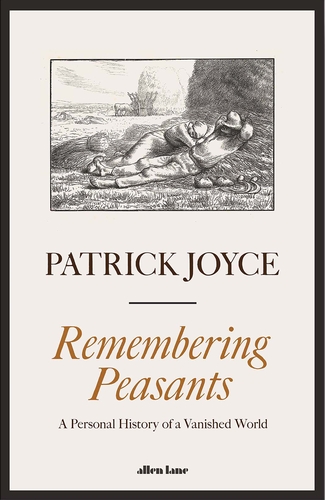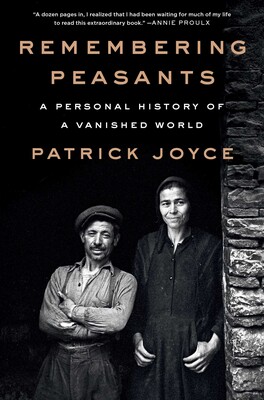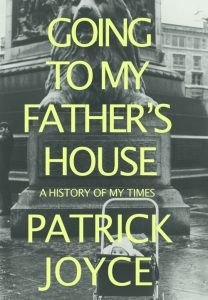Welcome to this website. I am a social historian of modern Britain and Europe and Emeritus Professor of History at the University of Manchester.
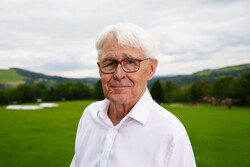
I have recently publishedd Remembering Peasants: A Personal History of a Vanished World with Allen Lane/The Penguin Press in the UK and Scribner/Simon and Schuster in the USA, February 2024.
The Penguin paperback is published February 13th 2025 in the UK and the Scribner US paperback around the same time. Penguin, £10.99
In the book I consider how peasants in advanced western societies are now being lost to memory after millenia of time as the dominant social group. This is a loss we all share. The writing invokes the Irish peasant past of my forbears but sets this in the context of the end of the European peasantry, west and east. Why should we remember, and how are peasants remembered now?
You can contact me at patrickjoyce2@gmail.com
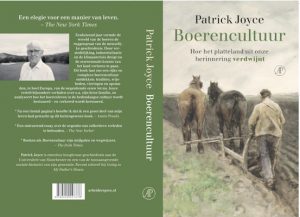

Remembering Peasants
Reviews
A dozen pages in I realized that I had been waiting for much of my life to read this extraordinary book. Anyone who has ever tried to unravel the intertwined skeins of ancestry, sociology, music, geography and history will gape at Joyce’s skill. On almost every page the reader gets a jolt, a palpable sensation of immersion in the disappeared world of peasantry. A central part of the book is Joyce’s own family’s peasant past. I too, like many people, am only two generations and one language away from these ancestors. Because the time of the peasants is still palpable there are clues and messages here for every fortunate reader who picks up this book.
Annie Proulx
Remembering Peasants: reviews, interviews, and features:
(Click on the links to download pdf documents.)
Reviews:
“Joyce’s study is an elegy for a way of life, … a moving and sensitive rumination…What gives Remembering Peasants its distinctiveness and its depth is the import of that word “personal” in his subtitle. Its poignancy is intimate…Joyce is as much a necromancer, summoning the dead and bidding them speak, as he is a conventional historian… His beautifully written book is …haunted by the ghosts of the dead but also full of the warmth of human sympathy. Remembering Peasants” is imbued with the diffuse and melancholy glow of a sinking sun.
The New York Times, Fintan O’Toole. “NYT Book Review -Remembering Peasants, by Patrick Joyce” – The New York Times.
Books such as Remembering Peasants are landmarks and waymarkers. …This is important, vital writing and study. The level of craftsmanship in the book is evident, but so too is its heart and soul. Reading it, I was changed and charged… Joyce is essential reading for anyone who cares about our shared past. A profound book.”
John Connell, The Irish Times
Remembering Peasants is a work of salvage and salvation, a great rescuing of Europe’s earth-toilers from historical neglect and erasure…a heart-writ valediction …Joyce is a propitious name for a writer of Irish heritage, but the author is more Heaney than Dubliners; his prose is peat-rich, dense with feeling as well as fact.
The Times, John Lewis-Stempel “Remembering Peasants, by Patrick Joyce – a review – the slow death of Europe’s earth toilers.” The Times.
Joyce is the modern historian of uncharted lives and the landscapes of post-industry and post-agriculture. Like all the Joyces, he writes with extraordinary precision and grace.
Colm Tóibín, Waterstones Favourite Reads, 2024
Rare for a book to change your self-perception, to give you not exactly a new perspective on your place in the great scheme of things, but a much richer sense of your place there. Reading this book you realise what you have always known, though only now can you recognise…
This book contains the seeds of more books, so numerous, deep and nuanced are the major themes uncovered. Fiona O’Connor, Morning Star
“In this elegiac history, Joyce presents a painstaking account of a way of life to which, until recently, the vast majority of humanity was bound… The relative absence of peasants from the historical record, and the blinding speed with which they seem to have disappeared, prompt a moving final essay on the urgency of preserving our collective past.”
The New Yorker (Best Books, 2024
“In a fascinating new book entitled Remembering Peasants, the historian Patrick Joyce has performed a recuperative service on behalf of an often disdained culture – one that now has all but vanished in Europe. Prof Joyce has set out to rectify the record for the lost peasant generations who, historically, “do not generally speak, they are spoken to”.
Guardian Opinion, Editorial on the launch of Historic England’s Everyday Heritage programme
Joyce takes us to some of the places Europeans have established to remember peasants …But the most poignant of all are journeys to his ancestral home in Ireland’s far west… As its title indicates, Joyce’s lament is also a call to remember. Well written, expansive and often deeply moving, this is a fitting monument to Europe’s peasants.
The Financial Times, Luka Ivan Jukic
Joyce writes with a split consciousness, like a man recounting his dreams. It was so real, this lost life, and yet it is impossible to recapture
‘[Joyce] rages against the amnesia hardwired into today’s “all consuming” present…. A loving and unconventional work of genealogy, and a melancholic elegy for bygone ways of being.’ The Literary Review, Jeremy Harte
When all the peasants of Europe have vanished, it will be impossible to recapture the life and labour they’ve taken with them. But this book, a lovely, scholarly, feeling (though never sentimental) account of glimpses and fragments, lifts a corner of the curtain on a world that will soon, to almost everyone, seem unimaginably strange and distant. Lucy Lethbridge, Prospect
For the past fifty years we have been basking in false promises of endless material abundance. As that promise begins to crack on a rapidly warming planet awash with extinctions, poisons, incomprehensible injustices, and still full of so many surviving beauties, the hardship and resilience of the peasant may no longer seem as irrelevant as it did even a decade or two ago. We should be grateful to Patrick Joyce for this book. Where we’re going, we might need it. Gus Mitchell, Commonweal
[Joyce] rages against the amnesia hardwired into today’s “all consuming” present…. A loving and unconventional work of genealogy, and a melancholic elegy for bygone ways of being.,
The Irish Independent, Andrew Lynch
“Passionate, intelligent… heavyweight and compassionate.’
Unherd
“Throughout the book, the reader is given an insight into the peasant structure and credo that, through its labour and sweat, once powered the economy of the world… It is not a book to be rushed as each chapter drops another layer of intricacy on to the lives of a section of society that has often been dismissed as “simple peasants”. It is all the better for this”
Diarmuid O’Donovan, Irish Examiner
“It is really an ode, an elegiac lament for the passing of a distinctive way of life. But it is also something more personal, as the subtitle suggests: an act of veneration for the author’s own family”,
Spectator, Jonathan Sumption
“A first-class work combining social history and ethnohistory with an unerring sense for a good story.”
“An insightful and evocative homage to the peasant way of life… Readers will be enthralled.”
—Publishers Weekly(starred review)
Interviews:
“Patrick Joyce: The history of peasants is one of their silence or being silenced. Observer, Books Q&A by Julian Coman, 4 February 2024 For pdf link, The Guardian.
“We might have to live on the edge. We may have to learn to be survivors.”. Irish Times interview by Patrick Freyne, 12 Feb 2024 For page spread pdf see The Irish Times.
To come: interview with Dutch newspaper Trouw, on publication of the Dutch translation of the book, May 2024.
Features
Daily Telegraph , 11 February 2024 February, “How England’s peasantry was betrayed by the middle classes.”
Irish Independent, 7 February, 2024, “Why we risk a great deal when we-forget our peasant past” The Irish Independent,
Podcasts:
Mark Bitmann Project, USA: https://bittmanproject.com/food-with-mark-bittman-patrick-joyce/
BBC HistoryExtra, UK: to come
In recent writing I have also combined history, memoir, and photography in my Going to my Father’s House: A History of My Times. Published by Verso, Spring 2021.
Going to my Father’s House: A History of My Times- published 27th July 2021
Buy from AmazonCritical reception, Going to My Father’s House:Observer Books of the Year, 2021, Colm Toibin,
I enjoyed Going to My Father’s House, a haunting meditation on Ireland and England, war and migration, Derry and Manchester. I admired the originality of his observations and his tone of melancholy, calm wisdom.
Terry Eagleton, Hegel would have enjoyed the way he lets a sharply delineated life distil a whole social history.
Seamus Deane,Style like this is a triumph and it does have a transformative effect. This is a rare kind of writing. Only a voice such as this can alert us to these historical worlds.
Paul Ginsborg, I can’t think of another historian around who could write something so suggestive and profound, so much on both a minor and major scale, constantly tracing the connections between the two.
Claire Connolly, Irish Times, There is a fierce frankness to Joyce’s book: he has made his choices. Along with an unmistakable authenticity in the telling and real urgency in the analysis, this is a book to read for the pleasure of mind and memory at work.”
Photograph of Patrick Joyce by Jon Super
